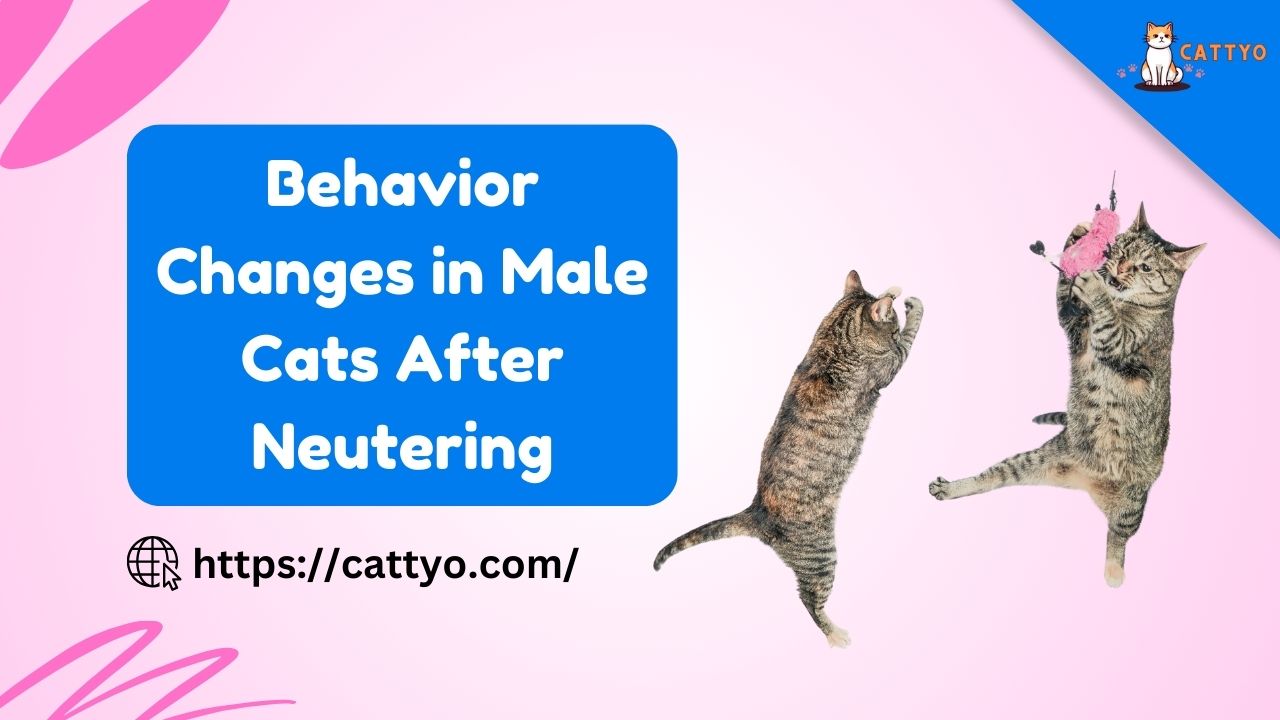Neutering your male cat is one of the most common procedures for cat owners, but how does it really impact your furry friend’s behavior?
You might think neutering is just about preventing unwanted kittens, but it can do a whole lot more.
In fact, after the procedure, your cat may change in ways you might not expect. Some of these changes are subtle, and some are downright surprising.
So, What Happens After Neutering?
When a male cat is neutered, it means removing his testicles. Without those testosterone-producing glands, many of his natural instincts and behaviors start to shift. The big question is—how does this play out in everyday life?
1. Decreased Aggression
Before neutering, your male cat may be territorial and ready to fight at the drop of a hat. You’ve probably seen it—scratching posts, bared claws, maybe even a few growls. After neutering, though, these aggressive tendencies can drop significantly. Why? Testosterone is a major driver of aggression in male cats, so with less of it in their system, their need to fight for dominance and defend their turf diminishes.
Think of it like a guy who suddenly doesn’t have to prove himself anymore. A little less chest-thumping and a bit more chilling on the couch.
2. Reduction in Roaming
Ah, the wanderer. Male cats who are not neutered have a strong instinct to roam in search of mates. If your cat has been MIA for hours (or days), he’s probably out there trying to impress the ladies. After neutering, however, his desire to wander significantly decreases. Instead of heading out on a “cat-tastic” adventure, he’ll be more likely to stay close to home.
It’s like the difference between someone who loves spontaneous road trips and someone who’s content to stay in and binge-watch their favorite series. Once neutered, your cat’s priorities shift a bit.
3. Litter Box Behavior Gets Better (Most of the Time!)
Let’s talk about one of the more interesting behaviors male cats are known for—spraying. Male cats who aren’t neutered tend to mark their territory with a spray that can smell absolutely awful. But once they’re neutered, this behavior often decreases or even stops altogether.
That being said, not every cat will stop spraying immediately. In some cases, it can take a little time for the behavior to fully subside. And if your cat has been spraying for a while, it might even become a habit that takes more than just neutering to break. But, hey, it’s definitely a step in the right direction.
4. More Affectionate
If you’ve ever noticed your male cat acting a bit distant or independent, neutering can sometimes make him more affectionate. Some people report that their cats become cuddlier after the procedure. It’s not guaranteed, of course—every cat is different—but the changes in hormone levels can sometimes make them more open to snuggling on the couch or curling up next to you for a nap.
It’s kind of like when a tough, stoic character in a movie softens up after a life-changing experience. Neutering doesn’t make them all soft and gooey, but it can reduce that “I’m too cool for affection” attitude.
5. Weight Gain
Here’s where things get a little tricky. Neutered cats are known to have a higher chance of gaining weight. It’s not because they suddenly develop a deep love for food, but rather because their metabolism tends to slow down after neutering. You might notice that your cat is less active, more chill, and perhaps a little rounder around the edges.
But don’t worry too much. With the right diet and exercise, you can help your neutered cat stay fit. It’s just a good idea to watch his food intake and make sure he’s getting enough playtime to keep him moving.
Table Of Summary of Behavior Changes in Neutered Male Cats
| Behavior | Before Neutering | After Neutering |
|---|---|---|
| Aggression | Higher (fighting, marking) | Lower (more laid-back) |
| Roaming | Frequently outdoors | Less likely to roam |
| Spraying | Common, territorial marking | Reduced or stopped |
| Affection | Independent, less cuddly | Can become more affectionate |
| Weight | Active, lean | Possible weight gain if not managed |
| Vocalization (meowing) | Loud, often related to mating | Less frequent, quieter |
FAQs: Answers to Your Neutering Questions
1. How soon after neutering will I notice behavior changes?
It varies, but you might see some changes within a few days, like reduced aggression or less roaming. Other behaviors, like spraying, might take a few weeks to change. And for some cats, the full impact can take months.
2. Will neutering make my cat lazy?
It’s possible. Neutering can reduce some of the energy-driven behaviors that male cats have, like roaming and fighting. As a result, some neutered cats become a bit more relaxed at home. But this isn’t the same as being “lazy”—just less hyperactive.
3. Will my neutered cat still be able to mate?
Nope! After neutering, your male cat can’t reproduce. That’s one of the main reasons for the procedure—to prevent unwanted litters.
4. Can neutering help with my cat’s behavior issues?
In many cases, yes. Neutering helps reduce unwanted behaviors like fighting, spraying, and excessive meowing. However, some behaviors may be learned habits that take time to change.
Final Thoughts: Is Neutering Worth It?
Neutering can certainly change a lot about your cat’s behavior, but not everything will be dramatically different.
You might get a calmer, less aggressive cat who is more affectionate—but you might also face some challenges, like weight gain. Still, the benefits often outweigh the drawbacks.
You’re not just helping your cat live a happier life, but you’re also contributing to reducing the number of unwanted kittens out there.
So, is it worth it? Absolutely. Just be prepared for a bit of a transition, and remember that your cat’s personality is unique.
Neutering might be the game-changer, but it’s not a magic wand that transforms your pet overnight. Give it time, keep an eye on his health, and enjoy the (often quieter) new phase of your feline’s life.






